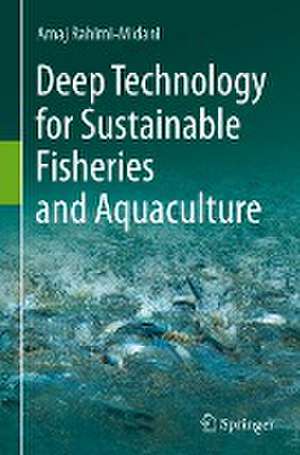Deep Technology for Sustainable Fisheries and Aquaculture
Autor Amaj Rahimi-Midanien Limba Engleză Hardback – 13 aug 2023
This book uses real-world examples from the aquaculture industry to demonstrate how deep technology is assisting farmers and vulnerable communities. Works conducted by Poseidon-AI (a deep tech company involved in the aquaculture sector) in different countries are presented as case studies to show the positive impacts of deep tech involvement in the aquaculture sector.
Primary industries, such as fisheries and aquaculture, rely heavily on labor. Furthermore, the manual practices of these farming methods increase material waste and reduce yields, resulting in higher costs and lower revenues. Poikilotherms make up the majority of aquatic animals, and environmental changes have a significant impact on them. This means that, due to climate change, farming of these animals cannot continue in the same way that it has for centuries. Artificial intelligence, machine learning, image processing, sensing, and automation are approaches that can assist these farms in dealing with rapid environmental changes while also assisting farmers in growing their businesses sustainably. This book is of interest to climate change scientists, entrepreneurs, investors, civil workers, and policymakers. Furthermore, the book is a great complimentary material for graduate students of fisheries, aquaculture, ecology, soil science, water management and environmental sciences. All national and international policymakers working in implementation of UNSDGs and sustainability, will find this book a useful read.
Preț: 897.33 lei
Preț vechi: 1094.30 lei
-18% Nou
Puncte Express: 1346
Preț estimativ în valută:
171.76€ • 186.63$ • 144.37£
171.76€ • 186.63$ • 144.37£
Carte tipărită la comandă
Livrare economică 21 aprilie-05 mai
Preluare comenzi: 021 569.72.76
Specificații
ISBN-13: 9789819949168
ISBN-10: 9819949165
Pagini: 300
Ilustrații: XVIII, 300 p. 1 illus.
Dimensiuni: 155 x 235 mm
Greutate: 0.63 kg
Ediția:1st ed. 2023
Editura: Springer Nature Singapore
Colecția Springer
Locul publicării:Singapore, Singapore
ISBN-10: 9819949165
Pagini: 300
Ilustrații: XVIII, 300 p. 1 illus.
Dimensiuni: 155 x 235 mm
Greutate: 0.63 kg
Ediția:1st ed. 2023
Editura: Springer Nature Singapore
Colecția Springer
Locul publicării:Singapore, Singapore
Cuprins
Chapter 1. Introduction.- Chapter 2. Deep Tech Practices in Aquaculture.- Chapter 3. Poseidon-AI, Where Aquatic Intelligence Meets Artificial Intelligence.- Chapter 4. Comparison of Aquaculture Practices with & without Deep Tech.- Chapter 5. Use of Deep Tech in Integrated Aquaculture Systems.- Chapter 6. Poseidon-AI Integrated Aquaculture Modules.- Chapter 7. Sustainable Development Goals, Deep Tech, and The Path Forward.
Notă biografică
Dr. Amaj Rahimi-Midani graduated from Pukyong National University (PKNU) in Busan, South Korea. He pursued his post-doctoral fellowship as a climate change modeler by analyzing the climate change impact on European freshwater species. He is the founder and CEO of Poseidon-AI located in Singapore. He has extensive working experience with international organizations in implementing sustainable practices related to water, soil, aquaculture, and fisheries around the world. He has many peer-reviewed international publications and delivered numerous oral and poster presentations in numerous international meetings, conferences, and congresses.
Textul de pe ultima copertă
This book uses real-world examples from the aquaculture industry to demonstrate how deep technology is assisting farmers and vulnerable communities. Works conducted by Poseidon-AI (a deep tech company involved in the aquaculture sector) in different countries are presented as case studies to show the positive impacts of deep tech involvement in the aquaculture sector.
Primary industries, such as fisheries and aquaculture, rely heavily on labor. Furthermore, the manual practices of these farming methods increase material waste and reduce yields, resulting in higher costs and lower revenues. Poikilotherms make up the majority of aquatic animals, and environmental changes have a significant impact on them. This means that, due to climate change, farming of these animals cannot continue in the same way that it has for centuries. Artificial intelligence, machine learning, image processing, sensing, and automation are approaches that can assist these farms in dealing with rapid environmental changes while also assisting farmers in growing their businesses sustainably.
This book is of interest to climate change scientists, entrepreneurs, investors, civil workers, and policymakers. Furthermore, the book is a great complimentary material for graduate students of fisheries, aquaculture, ecology, soil science, water management and environmental sciences. All national and international policymakers working in implementation of UNSDGs and sustainability, will find this book a useful read.
This book is of interest to climate change scientists, entrepreneurs, investors, civil workers, and policymakers. Furthermore, the book is a great complimentary material for graduate students of fisheries, aquaculture, ecology, soil science, water management and environmental sciences. All national and international policymakers working in implementation of UNSDGs and sustainability, will find this book a useful read.
Caracteristici
Cover the use of deep technology in the fisheries and Aquaculture industries Provides real-world examples from the aquaculture industry to demonstrate the impact of deep technology The content is well aligned with UN SDGs and global sustainability
